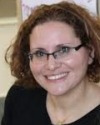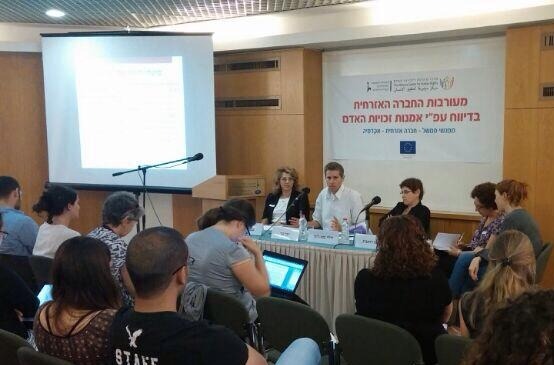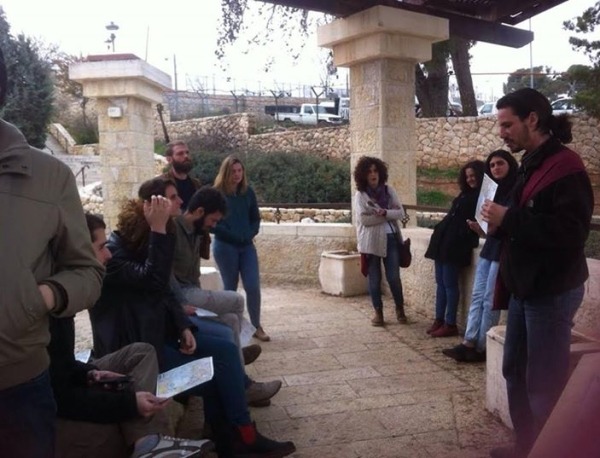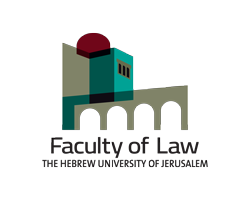The International Human Rights Clinic
Every student at the Faculty knows that the legal clinics offer one of the most interesting experiences the Faculty has to offer. In this issue, we focus on the International Human Rights Clinic.
- Sapir Dayan -
Every year a large number of students apply to join one of the eight legal clinics active at the Faculty. Many students write lengthy and impassioned explanations on the application forms and endure a nail-biting wait, only to receive the disappointing news that there are no places left. The legal clinics are not only popular because they offer a welcome change from classes, textbooks, and reading lists. The Faculty’s clinics, directed by Dr. Einat Albin, provide a real opportunity for students to use their legal knowledge to engage in meaningful social action. The students work with diverse disadvantaged populations, most of whom have little chance of meeting a regular attorney. They work with people with disabilities, migrant workers, refugees and asylum seekers, youth at risk, people involved in criminal proceedings, Haredi women, new immigrants, and others.
In this issue we focus on the International Human Rights Clinic – one of the eight clinics in the Clinical Legal Education Center - which provides legal assistance for individuals and organizations in the field of human rights. In particular, the clinic seeks to encourage the recognition and protection of the right to equality and dignity; social, economic, and cultural rights; and human rights during a state of emergency. Attorney Neta Patrick and Professor Tomer Broude directed the clinic last year, while this year Attorney Bana Shoughry-Badarne is working alongside Professor Broude. The clinic works with civil society organizations to promote projects relating to human rights protected under international law and to encourage the inculcation of international human rights law within Israeli law.

Attorney Bana Shoughry-Badarne
(photo: Talia Shein)
The following is just a small sample of the clinic’s work over the past year. The students are currently working to prepare a Supreme Court petition concerning the accessibility of the Executor’s Office to Arabic speakers. A final letter prior to instigating proceedings is due to be sent by the end of the month. In a related field, the clinic is representing residents of the Isawiyya neighborhood in their efforts to persuade the municipality to address the chronic shortage of classrooms in the neighborhood. Regarding the rights of minor asylum seekers, the clinic is working to prepare a legal opinion concerning the right to health of minors ahead of a seminar on the subject due to be held at the end of the 2014/15 academic year. The clinic also submitted an application for status for a minor who was born in Israel to a tourist who abandoned him due to a severe disability. The minor has received temporary resident status and the clinic is continuing to work to secure permanent status. In another case regarding status, the clinic submitted an appeal on behalf of three people from East Jerusalem - a father and two of his four children – which may find themselves expelled from the city, essentially due to circumstances related to their poverty.
Sixteen students work in the clinic in various projects according to their fields of interest. The students undertake in-depth legal research and prepare legal opinions, proposed laws, research reports, correspondence with the authorities, administrative appeals, and Supreme Court petitions. The students are involved in every aspect of the legal proceedings. They meet with clients, organizations, and senior legal figures from the public service, and they attend court hearings. This year, under the guidance of Attorney Bana Shoughry-Badarne, the clinic is running some interesting and intriguing projects. Particular emphasis is placed on promoting the right to equality by opposing discriminatory threshold requirements for jobs; advancing the right to language and education in East Jerusalem; strengthening the obligation to investigate complaints of torture; supporting the right to rehabilitation of asylum seekers who were the victims of torture outside Israel; promoting the right to health of minor asylum seekers; advancing the rights of stateless persons born in Israel; and enhancing the protection of human rights in times of emergency.
Another project run by the clinic this year is the preparation of a proposed law to improve the investigation of complaints raising suspicion of torture. The clinic is working with the Aid Organization for Refugees and Asylum Seekers in Israel (ASSAF) to prepare a shadow report for submission to the Committee against Torture. The report will focus mainly on the obligation to rehabilitate victims of torture who entered Israel through Sinai. Another proposed law the students are preparing seeks to challenge threshold conditions for jobs that discriminate against some candidates (particularly Mizrachim and women). The clinic also submitted a request for information according to the Freedom of Information Act on the existing procedures for the closure of traffic arteries in a state of emergency, and whether such procedures take into account the human rights of those affected by such blockages (including freedom of movement and the right to education, health, and work).
Last year, one of the clinic’s areas of work was the drafting of proposed laws concerning an emerging field in international human rights law known as “human rights defenders” – a group for whom the United Nations adopted a declaration in 1998 calling for their protection. Attorney Neta Patrick explains that in recent years human rights activists around the world and in Israel have increasingly faced harassment in an attempt to silence public protests sparked by their work. An example of such harassment is a libel suit in the sum of millions of shekels submitted by a recycling corporation against an environmental activist in an attempt to halt his campaign. The corporation’s harassment is directed at the activist as an individual, and accordingly is liable to be particularly effective, leading him to abandon his struggle and deterring others from joining.

Seminar for civil society organizations
Together with the parliamentary assistant to MK Zehava Galon, the students at the clinic researched the issue and considered when and how human rights defenders would require special protection under Israeli law. One instance when the principles in the international declaration could be used was when a political activist is subjected to sexual harassment by a police officer at a demonstration. The Knesset Committee on the Status of Women discussed this issue, which it considered to be a familiar phenomenon. The students suggested that the Prohibition of Sexual Harassment Law should be amended to include a specific clause concerning sexual harassment against human rights activists, since this constitutes a distinct category of sexual harassment. If adopted, the amendment would reflect recognition that additional tools are need to combat harassment intended to silence protest and to deter activists from acting in the public interest.
Both last year and this year, the clinic has worked on a unique project that is the first of its kind in Israel, in cooperation with the Minerva Center for Human Rights. The students Bassam Hazan, Lena Mahula, and Tal Darnitzky compiled the first ever Hebrew-language guide to writing “shadow reports.” The guide seeks to enhance access to reporting proceedings for human rights organizations. A shadow report is a report submitted by civil society organizations to the United Nations human rights committees, serving as a principal source of information for these committees regarding the manner of implementation of the various international conventions in the relevant country. The preparation of these reports requires a familiarity with the reporting mechanism, extensive knowledge of the alleged violation, the allocation of resources, and attention to wording and precision. Even large and well-established human rights organizations may encounter difficulties and obstacles that deter them from participating in the reporting process. The students identified this weakness and prepared the guide in response. They also held a special seminar for civil society organizations on the subject of working with the UN human rights committees.

Tour of East Jerusalem as part of the clinic’s work this year to promote a municipal outline plan in East Jerusalem
One of the students described her work in the clinic as “the most important experience I’ve had so far during my studies. The work is interesting and you have a sense of mission. But apart from that, I have also been exposed to reality. Frontal lectures cannot always describe the reality on the ground. The clinic gave me a chance to experience the work of an attorney, including fascinating aspects as well as routine chores. Now I feel that I know what I’m heading for and what I want to do, and this has also helped me focus my academic studies.” The clinics’ admirable work is a classic win-win scenario. The students learn new things and enjoy an opportunity to engage in meaningful work; the public benefit from their high-quality pro bono work, under the professional supervision of senior attorneys; and the students end it all after completing another six credit points toward their degree.

